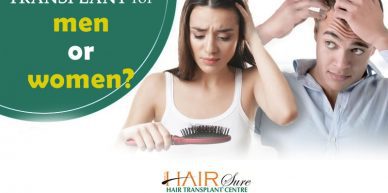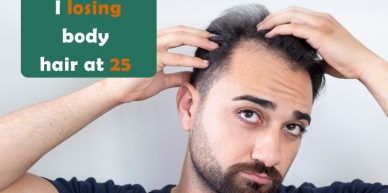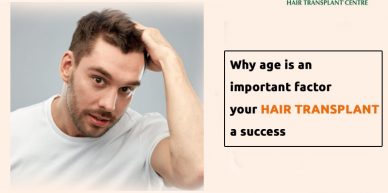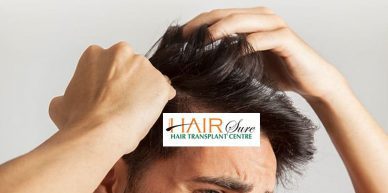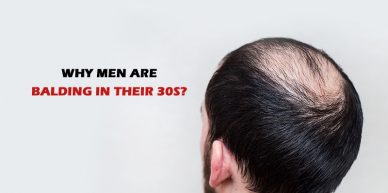Hair transplants are a cosmetic procedure for both men and women experiencing hair loss, often due to hereditary male or female pattern baldness. Hormonal changes, medical conditions, or trauma can also cause hair loss. The procedure involves taking hair follicles...
What causes Hair loss in Male business people
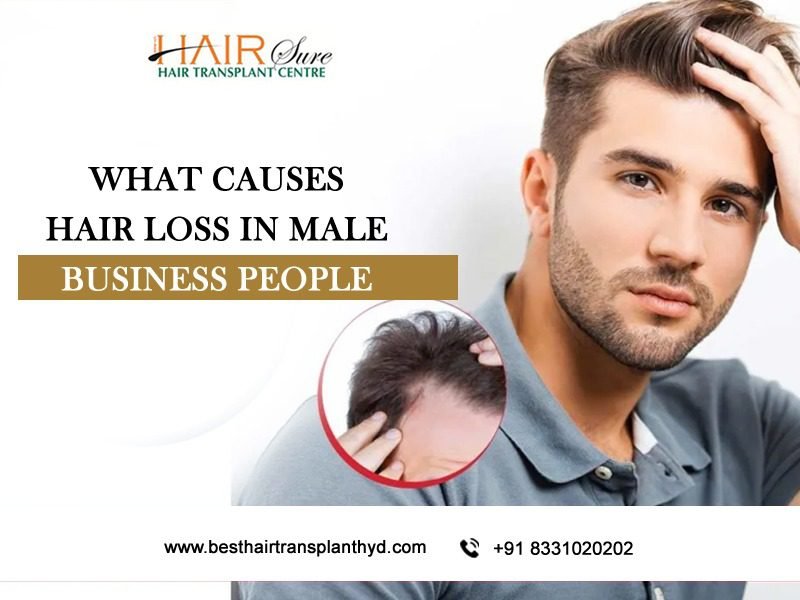
Hair loss, also known as male pattern baldness or androgenetic alopecia, is a common issue for men worldwide. It is a result of genetic, hormonal, and environmental factors. Genetic predisposition, primarily inherited from parents, is a significant factor, with the hormone dihydrotestosterone (DHT) being a key trigger. DHT shrinks hair follicles, causing shorter and thinner growth cycles. Stress, poor nutrition, medical conditions, medications, and lifestyle practices can exacerbate hair loss. The psychological consequences of hair loss are profound, affecting self-confidence, self-image, and interpersonal relationships. Men experiencing hair loss may experience reduced self-esteem and increased insecurity, while social stigmatization and societal perceptions can further compound these emotional challenges, potentially leading to anxiety and depression. Understanding the underlying causes, potential impacts, and available solutions is crucial for men seeking to manage or prevent hair loss.
Causes and reasons for hair loss in businessmen:
Hair loss, or androgenetic alopecia, is a complex condition influenced by genetic, hormonal, and lifestyle factors. There is no direct cause of hair loss in businessmen, but lifestyle and environmental factors can contribute to or exacerbate the condition. Stress, lifestyle, and habits associated with the profession can contribute to or exacerbate hair loss. Some leading causes include genetic, hormonal, and lifestyle factors.

- Stressful lifestyle:
- The demanding and high-pressure nature of many business roles can lead to chronic stress, a known contributor to hair loss.
- The stress cycle disrupts hair growth and can result in hair loss.
- Hormonal factors:
- Stress can affect hormone levels in the body, including increasing the production of dihydrotestosterone (DHT), a hormone linked to male pattern baldness.
- Businessmen experiencing chronic stress may have elevated DHT levels, contributing to hair loss.
- Lack of self-care:
- Busy business schedules can sometimes lead to neglecting self-care, including proper nutrition, exercise, and sleep.
- Poor lifestyle habits can indirectly contribute to hair loss by affecting overall health.
- Hairstyling habits:
- Frequent use of tight hairstyles, constant wearing of hats, or excessive use of hair products for a polished appearance can strain hair follicles and contribute to hair loss.
- Genetics predisposition:
- Male pattern baldness, primarily influenced by genetics, is the most common cause of hair loss in men.
- Ageing:
- As men get older, the likelihood of experiencing hair loss increases.
- Male pattern baldness often starts in the late teens to early twenties and progresses with age.
- Sedentary lifestyle:
- Many business roles involve prolonged periods of sitting or a lack of physical activity, which can negatively impact overall health, including hair health.

- Medications:
- Businessmen may be more likely to take medications for stress, anxiety, or other health issues, and some medicines can have hair loss as a side effect.
- Environmental factors:
- Business environments, especially in urban settings, may expose individuals to pollution and toxins that can impact hair health.
- Nutrition and diet:
- A poor diet lacking essential nutrients, such as vitamins, minerals, and proteins, can impact hair health and contribute to hair loss.
- Medical conditions:
- Hair loss can be brought on by medical issues such as thyroid problems, autoimmune disorders, and scalp infections.
- Medications:
- Some medications, such as those used for cancer, arthritis, depression, heart problems, gout, and high blood pressure, can lead to hair loss as a side effect.
- Underlying health conditions:
- Certain medical conditions like alopecia areata (an autoimmune disorder), trichotillomania (hair-pulling disorder), and fungal infections can cause hair loss.
- Sudden weight loss:
- Rapid and significant weight loss, often seen with crash diets, can trigger hair loss due to the stress it places on the body.
- Lack of sleep:
- Businessmen often face irregular sleep patterns and sleep deprivation, which can negatively impact overall health, including hair growth.
- Tight hairstyles and styling practices:
- Frequent use of tight hairstyles, such as wearing a tight ponytail or constantly wearing a hat, can stress hair follicles and contribute to hair loss.
- Harsh haircare products:
- Excessive use of hair styling products, heat treatments, and harsh chemicals can damage hair and weaken follicles, leading to hair loss.
- Lack of physical activity:
- Sedentary lifestyles, common among office workers and business professionals, can affect overall health and potentially impact hair growth.
Individual experiences may vary, so consulting a healthcare professional or dermatologist can provide personalised guidance and recommend appropriate treatments or lifestyle changes.
The recommended diet for businessmen suffering from hair loss:
Business professionals with frequent travel should maintain a healthy diet to control hair loss and accommodate the challenges of frequent travel. This recommended diet focuses on essential nutrients.
- Lean proteins:
- Include lean protein sources such as poultry, fish, eggs, and legumes.
- Protein is necessary for the growth and structure of hair.
- Omega-3 fatty acids:
- Consume plant-based sources like flaxseeds and walnuts or fatty fish like salmon, mackerel, and sardines.
- Omega-3 fatty acids promote scalp health and may reduce inflammation that can contribute to hair loss.
- Iron-rich foods:
- Include foods high in iron such as lean red meat, spinach, lentils, and fortified cereals in your diet.
- Iron is crucial for proper hair growth and preventing hair thinning.
- Vitamins and minerals:
- Opt for various colourful fruits and vegetables to ensure a range of vitamins and minerals.
- To support hair health, focus on foods rich in vitamin C (oranges, strawberries, bell peppers) and vitamin A (carrots, sweet potatoes, kale).
- Biotin sources:
- Include foods containing biotin, such as eggs, nuts (like almonds), and whole grains (like oats).
- Biotin is known to promote hair growth and overall hair health.
- Zinc-rich foods:
- Choose foods high in zinc, such as lean meats, pumpkin seeds, and chickpeas.
- Zinc supports the repair and growth of hair tissue.
- Hydration:
- Throughout your journey, make sure to consume enough water to stay hydrated.
- For overall health, including the health of your hair, you must drink enough water.
- Smart snacking:
- Pack nutrient-rich snacks like trail mix (nuts, seeds, and dried fruits), yoghurt, or cut vegetables.
- Healthy snacks can help you maintain a balanced diet while on the go.
- Limit processed foods and sugars:
- Minimise consumption of processed foods, sugary snacks, and beverages, as they can impact overall health and potentially contribute to hair loss.
- Consult a nutritionist:
- Consider consulting a nutritionist or dietitian to create a personalised meal plan that addresses your dietary needs and travel constraints.
Maintaining a balanced diet is crucial for long-term hair health, but addressing stress, hormonal imbalances, and hair care practices is also essential. A healthcare professional or dermatologist can provide a comprehensive approach to managing hair loss while leading a busy lifestyle.
Businessmen should take special care to control hair loss:
Businessmen can manage hair loss by taking special care measures, including avoiding excessive use of products, excessive stress, and focusing on self-care.
- Stress management:
- Prioritise stress reduction techniques such as meditation, deep breathing, yoga, or mindfulness to manage work-related stress, which can contribute to hair loss.
- Nutrition and diet:
- Consume a balanced diet rich in vitamins, minerals, and proteins for healthy hair growth.
- Focus on foods containing biotin, zinc, iron, omega-3 fatty acids, and antioxidants to support hair health.
- Medications and treatments:
- Consult a healthcare professional to discuss potential medication options, such as finasteride or minoxidil that may help slow down hair loss and promote regrowth.
- Gentle hair care:
- Avoid tight hairstyles that strain hair follicles.
- Use mild and sulfate-free shampoos and conditioners to prevent further damage.
- Hairstyling practices:
- Minimise heat styling tools, such as hair dryers and straighteners, which can weaken hair.
- Opt for hairstyles that do not pull on the hair or stress the follicles.
- Scalp care:
- Keep the scalp clean and healthy to promote optimal hair growth.
- Consider using a gentle exfoliating shampoo to remove excess oil and debris.
- Regular exercises:
- Regular physical activity improves overall health, circulation, and stress management.
- Sleep hygiene:
- Prioritise sufficient and quality sleep to support overall well-being and hair health.
- Consultation with professionals:
- Seek guidance from a dermatologist or trichologist to determine the underlying cause of hair loss and explore personalised treatment options.
- Cosmetic solutions:
- Consult with a skilled hairstylist who can recommend suitable haircuts and styles to create the appearance of thicker hair.
- Consider using volumizing hair products to add texture and fullness.
- Wigs and hairpieces:
- Explore high-quality wigs or hairpieces as temporary solutions to enhance hair density and appearance.
- Avoid self-diagnosis and overreacting:
- Avoid self-diagnosing the cause of hair loss; consult a medical professional for an accurate assessment and tailored recommendations.
- Remember that hair loss is a common concern; seeking support from friends, family, or support groups can provide emotional relief.
Individual hair loss experiences are unique, and practical measures may vary. Consulting a healthcare professional is crucial for personalised advice and guidance on managing hair loss while maintaining a demanding business lifestyle.
Hair loss affects men’s physical appearance and emotional well-being. Understanding its causes and seeking appropriate interventions can help men manage and mitigate its impact. A comprehensive approach combining medical treatments, lifestyle adjustments, and cosmetic strategies can help men regain confidence, maintain self-esteem, and lead fulfilling lives despite challenges.
At Cyber HairSure, we are dedicated to a policy of offering patients unmatched services. At Cyber HairSure Advanced Hair Transplant Clinic, all of your hair-related worries can be expertly resolved, and you can rest assured that your smiles won’t flinch again. Enter Cyber HairSure and exit with the desired appearance.
Cyber HairSure can assist in determining the precise reason for hair loss and offer suitable treatment solutions that are suited to the requirements of the individual. Always consult a medical expert when you have questions about your health. Always consult a medical expert when you have questions about your health.
We at Cyber HairSure, are committed to providing matchless services to all our patients. All your concerns regarding hair problems can be flawlessly sorted at Cyber HairSure Advanced Hair Transplant Clinic, guaranteeing that you will be left with smiles that won’t fall again. Walk into Cyber HairSure and walk back with the look that you desire. Call 040 49540202 / 8331020202 or email us at cyberhairsure@gmail.com to book your consultation. Visit our website, Hair Transplant Clinic, to know more.


